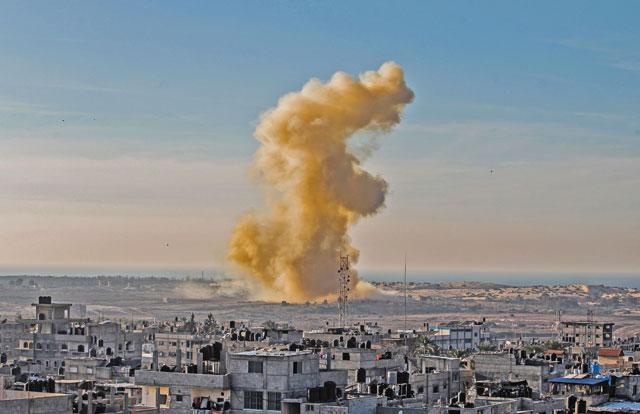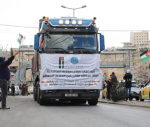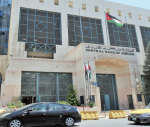You are here
Sinai carnage presses Egypt to seek new alliance with tribes
By Reuters - Nov 30,2017 - Last updated at Nov 30,2017

This photo taken on Tuesday from Rafah in the southern Gaza Strip shows smoke billows following an explosion close to the border on the Egyptian side of the divided city (AFP photo)
NORTH SINAI, Egypt — An attack that killed more than 300 people in North Sinai has prompted Egyptian officials to renew efforts to enlist local tribes whose support will be critical in attempts to defeat the Daesh extremist group, security and military sources said.
Brandishing a Daesh flag, masked men in military-style uniforms fired on worshippers at a village mosque on Friday in the worst such bloodshed in modern Egyptian history.
It was a dramatic setback for the military, which has been fighting militant groups in the Sinai Peninsula for years with air strikes, ground assaults and mass arrests, while hundreds of police and soldiers have been killed.
Lacking sufficient counterinsurgency skills, the army began recruiting tribesmen three years ago, hoping their mastery of the Sinai's inhospitable terrain would provide intelligence on the militants and their arms smuggling routes.
That campaign has produced limited results and the latest bloodshed will pressure the army to secure better cooperation from tribal leaders despite some gains against Daesh this year.
No group has claimed responsibility for Friday's assault, whose brutality shocked Egyptians.
Sisi calls for tough response, quick results
On Wednesday, President Abdel Fattah Al Sisi ordered the military to secure the Sinai within the next three months. "You can use all brute force necessary," he said.
Tribes in the Sinai vowed to unite and join forces with the army after fellow Bedouins were killed in Friday's carnage.
But such declarations by Sinai tribes — which accuse the Cairo government of treating them like second-class citizens — have in the past produced limited results. In addition, tribesmen remain divided over feuds and other local issues.
"The Egyptian military has more than enough weapons. The biggest issue when it comes to doing anything in the Sinai is to make sure they have good intelligence," said HA Hellyer, an Egypt expert and senior non-resident fellow at the Atlantic Council.
"If it is going to be a counterterrorism, counterinsurgency set of strategies, that will necessitate involvement from the tribes at a very significant level."
Three security and military sources said that over the past two days talks had been held between security officials and tribal leaders in north and central Sinai.
Those security officials said greater coordination and cooperation were needed to defeat the militants. The tribes were divided into five groups and security officials sat separately with each group.
"We asked them to help us to control the militants in the areas that they live, farm and move in, because each tribe knows its own people best," said one of the sources.
"There are many things that make them cooperate with us and they vary from each tribe to the next. That's why we sat separately with each tribe. One tribe needs services, and there is economic cooperation on projects with another tribe."
A spokesman for the military said it had made no statement on tribal affairs in Sinai and he could not comment
Success in Iraq
Alliances with tribes have succeeded in other countries facing serious extremist threats — under the right conditions.
In 2006, Sunni tribesmen joined forces with US troops in Iraq and rebelled against Al Qaeda in what became known as the "Sahwa", or Awakening.
By January 2009, Washington had invested more than $400 million in the Awakening programme, according to US data. Fighters were paid as much as $300-$400 a month.
That investment paid off, helping Iraqi security forces to defeat Al Qaeda then.
Under a Sisi initiative in 2015 to reinforce cooperation, several hundred Bedouins were to be recruited. Occasionally, they joined patrols and manned checkpoints under supervision.
But some tribal leaders were reluctant to team up with the army without more weapons to confront battle-hardened militant fighters. Authorities are wary of supplying arms to tribes with a history of animosity to Cairo, security officials say.
"When the security officials spoke to the tribal leaders, they told them that there is no third option in front of them. Either with us or against us," another source said.
"Most of the tribes immediately announced their cooperation with security forces, and others asked for some time to think. But I think that the security forces don't have the time to give them to think."
Mustafa Al Aqili, of the Supreme Council of Arab Tribes, said heavy losses in the mosque attack could encourage both sides to work more closely together. But he stressed waging war against radicals was the responsibility of the military.
"Sinai's people grew stronger after that attack and they are standing more with the army," he said. "They are keen to join the fighting. But that is the job of the army."
A security source in El Arish, the main city in North Sinai, said ties have improved.
"The Bedouins are cooperating with us and have increased their cooperation," he said.
Damage control
Bringing Sinai's tribes together and on the military's side will not be easy. The cash-strapped government would have to create jobs and invest in schools and infrastructure. To appease angry residents for now, authorities announced $10 million in funds shortly after the attack.
"We have no relationship with politics or anything else, and don't cooperate with the army or armed groups," said Mansur Eid, who lost his son in Friday's attack. "We just live in poverty here."
Egypt may face a bigger challenge if Daesh militants defeated in Iraq, Syria and Libya join comrades in the Sinai. Help from tribes would be even more important.
Friday's attack was similar to Daesh’s approach in Iraq, where it has bombed places of worship in a bid to deepen sectarian strife.
Sisi has said that fighters returning from Iraq and Syria may seek refuge in Libya and target Egypt from there.
In his most recent speech released in September, Daesh leader Abu Bakr Al Baghdadi urged followers in North Sinai to keep fighting after the group was defeated in Mosul.
Tribal leaders say there are around 800 militants, mostly Egyptians, with some Palestinians and other foreigners, in the North Sinai. But even small numbers of fighters have inflicted heavy casualties with suicide bombings in Egypt and elsewhere.
Daesh is also seeking to enlist tribesmen in the Sinai, and Ahmed Zagloul, a researcher on Islamist movements, said it had managed to recruit from the largest tribes.
By capitalising on frustrations with the government and civilian deaths, Daesh has won some support despite its brutal methods.
Many in the Sinai were not won over by the government's methods of fighting terrorism, which had left some villages completely destroyed, said Sheikh Ibrahim Al Menei, a leader of the Sawarka tribe.
Related Articles
CAIRO — One year after Egypt launched a large-scale operation against extremists in North Sinai, security forces remain locked in deadly bat
CAIRO — Egypt's interior ministry said on Monday it killed three "terrorist elements" in the Sinai Peninsula suspected of involvement in the
OCCUPIED JERUSALEM — A senior military officer has said Israel could attack militants affiliated to the Daesh terror group in neighbouring E














